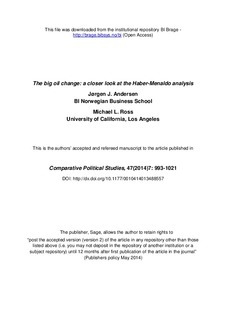| dc.contributor.author | Andersen, Jørgen Juel | |
| dc.contributor.author | Ross, Michael L. | |
| dc.date.accessioned | 2014-06-03T12:16:02Z | |
| dc.date.available | 2014-06-03T12:16:02Z | |
| dc.date.issued | 2014 | |
| dc.identifier.citation | Comparative Political Studies, 47(2014)7: 993-1021 | nb_NO |
| dc.identifier.issn | 1552-3829 | |
| dc.identifier.uri | http://hdl.handle.net/11250/195819 | |
| dc.description | This is the authors’ accepted and refereed manuscript to the article. Publisher's version is available at online.sagepub.com | nb_NO |
| dc.description.abstract | The claim that oil wealth tends to block democratic transitions has recently been challenged by Haber and Menaldo, who use historical data going back to 1800 and conclude there is no “resource curse.” We revisit their data and models, and show they might be correct for the period before the 1970s, but since about 1980, there has been a pronounced resource curse. We argue that oil wealth only became a hindrance to democratic transitions after the transformative events of the 1970s, which enabled developing country governments to capture the oil rents that were previously siphoned off by foreign-owned firms. We also explain why the Haber–Menaldo study failed to identify this: partly because the authors draw invalid inferences from their data and partly because they assume that the relationship between oil wealth and democracy has not changed for the past 200 years. | nb_NO |
| dc.language.iso | eng | nb_NO |
| dc.publisher | Sage Publications | nb_NO |
| dc.subject | resource curse | nb_NO |
| dc.subject | natural resources | nb_NO |
| dc.subject | autocratic survival | nb_NO |
| dc.subject | democratization | nb_NO |
| dc.subject | nationalization | nb_NO |
| dc.title | The big oil change: a closer look at the Haber-Menaldo analysis | nb_NO |
| dc.type | Journal article | nb_NO |
| dc.type | Peer reviewed | nb_NO |
| dc.source.pagenumber | 993-1021 | nb_NO |
| dc.source.volume | 47 | nb_NO |
| dc.source.journal | Comparative Political Studies | nb_NO |
| dc.source.issue | 7 | nb_NO |
| dc.identifier.doi | 10.1177/0010414013488557 | |
| dc.description.localcode | 2, Forfatterversjon | nb_NO |
